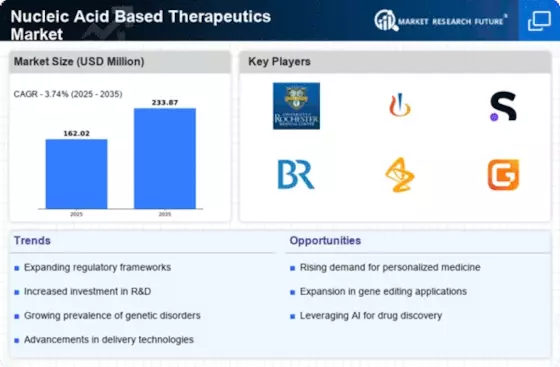Supportive Regulatory Frameworks
The Europe Nucleic Acid Based Therapeutics Market is bolstered by a supportive regulatory environment that encourages innovation and expedites the approval process for new therapies. Regulatory bodies, such as the European Medicines Agency (EMA), have established clear guidelines for the development and commercialization of nucleic acid-based products. This regulatory clarity is essential for fostering investment and research in the sector. Moreover, the introduction of fast-track approval pathways for breakthrough therapies is likely to enhance the speed at which new treatments reach the market. As a result, companies are more inclined to invest in the development of nucleic acid therapeutics, knowing that there is a structured process in place to facilitate their entry into the market.
Growing Investment in Biotechnology
The increasing investment in biotechnology is a crucial driver for the Europe Nucleic Acid Based Therapeutics Market. Venture capital funding and public-private partnerships are on the rise, with significant financial resources being allocated to research and development in nucleic acid-based therapies. In 2025, investments in European biotech companies reached approximately 10 billion euros, reflecting a robust interest in innovative therapeutic solutions. This influx of capital is likely to accelerate the development of new nucleic acid-based treatments, as companies seek to capitalize on the growing demand for personalized medicine. The financial backing is expected to enhance collaboration between academic institutions and industry players, further propelling advancements in the market.
Advancements in Delivery Technologies
Innovations in delivery mechanisms for nucleic acid therapeutics are significantly influencing the Europe Nucleic Acid Based Therapeutics Market. Enhanced delivery systems, such as lipid nanoparticles and viral vectors, are improving the efficacy and safety profiles of these therapies. For instance, the successful application of lipid nanoparticles in mRNA vaccines has demonstrated the potential of these technologies in delivering nucleic acids effectively. As a result, the market is witnessing a surge in research focused on optimizing delivery methods, which could lead to more effective treatments for various diseases. The European market is expected to benefit from these advancements, as they may facilitate the broader adoption of nucleic acid-based therapies in clinical settings.
Rising Demand for Personalized Medicine
The shift towards personalized medicine is reshaping the Europe Nucleic Acid Based Therapeutics Market. Patients are increasingly seeking treatments tailored to their genetic profiles, which aligns with the capabilities of nucleic acid-based therapies. These therapies offer the potential for targeted treatment strategies, particularly in oncology and rare diseases. The European market is witnessing a growing trend towards the integration of genomic data into clinical practice, which may enhance the development of personalized nucleic acid therapeutics. As healthcare providers and patients alike recognize the benefits of personalized approaches, the demand for nucleic acid-based solutions is expected to rise, driving market growth in the coming years.
Increasing Prevalence of Genetic Disorders
The rising incidence of genetic disorders across Europe is a pivotal driver for the Europe Nucleic Acid Based Therapeutics Market. With an estimated 30 million individuals affected by rare diseases in the region, the demand for innovative therapies is surging. This growing patient population necessitates the development of nucleic acid-based treatments, such as gene therapies and RNA-based therapeutics, to address unmet medical needs. Furthermore, the European Union has implemented various initiatives to support research and development in this field, which may further stimulate market growth. The increasing awareness and diagnosis of genetic disorders are likely to propel investments in nucleic acid-based solutions, thereby enhancing the overall market landscape.

















